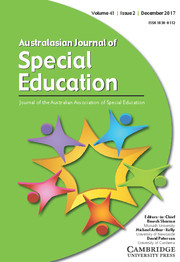No CrossRef data available.
Article contents
Len Cosson Memorial Lecture. Special Education Policy for Children with Moderate Learning or Behavioural Difficulties in New Zealand: Does “Inclusion” Really Mean “Exclusion“?
Published online by Cambridge University Press: 26 February 2016
Abstract
This invited Lecture is held at each National Conference of the New Zealand Special Education Association to honour the memory of Len (Leyland Duvalle) Cosson (1933–1987), and is sponsored by the Len Cosson Memorial Trust. Len was a distinguished New Zealand special educator, and at the time of his untimely death he was Principal Lecturer in Special education at Christchurch College of Education. At Christchurch, had established New Zealand’s first special 1‐year training course for teachers in special education; he wrote many influential handbooks and articles aimed at improving teaching practice in special education; and played a major role in the establishment of NZSEA.
- Type
- Other
- Information
- Copyright
- Copyright © The Australian Association of Special Education 1998




